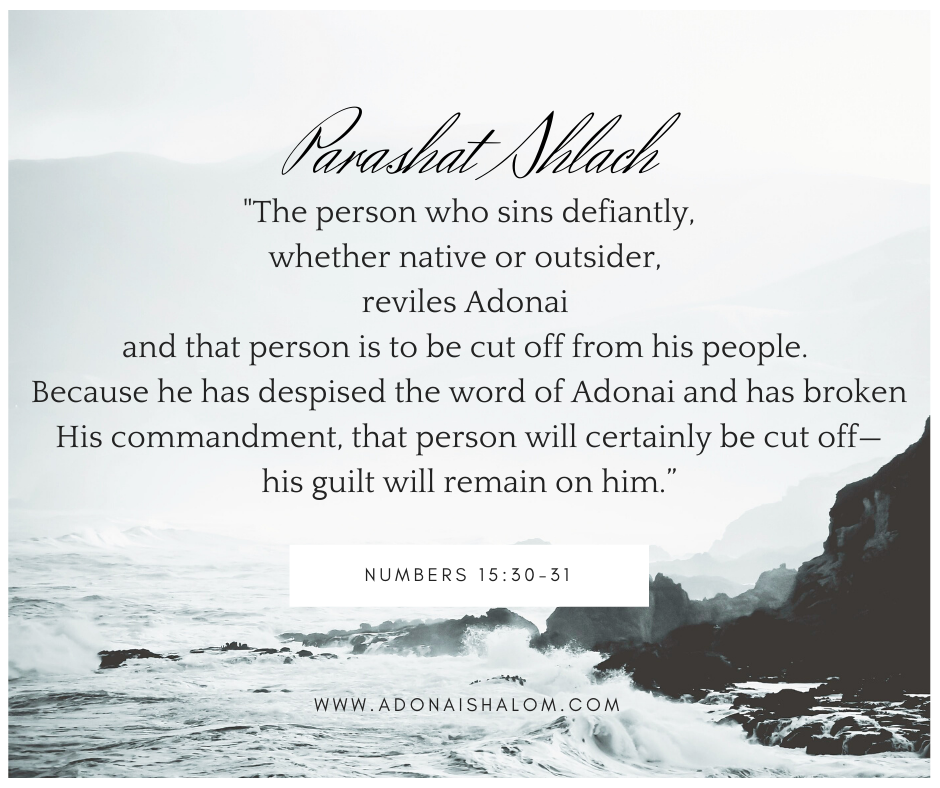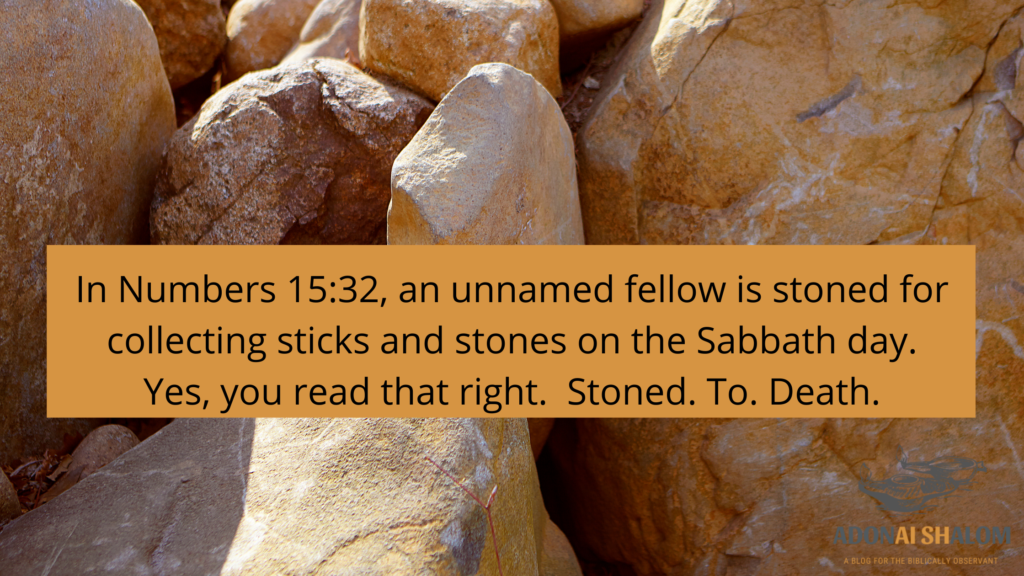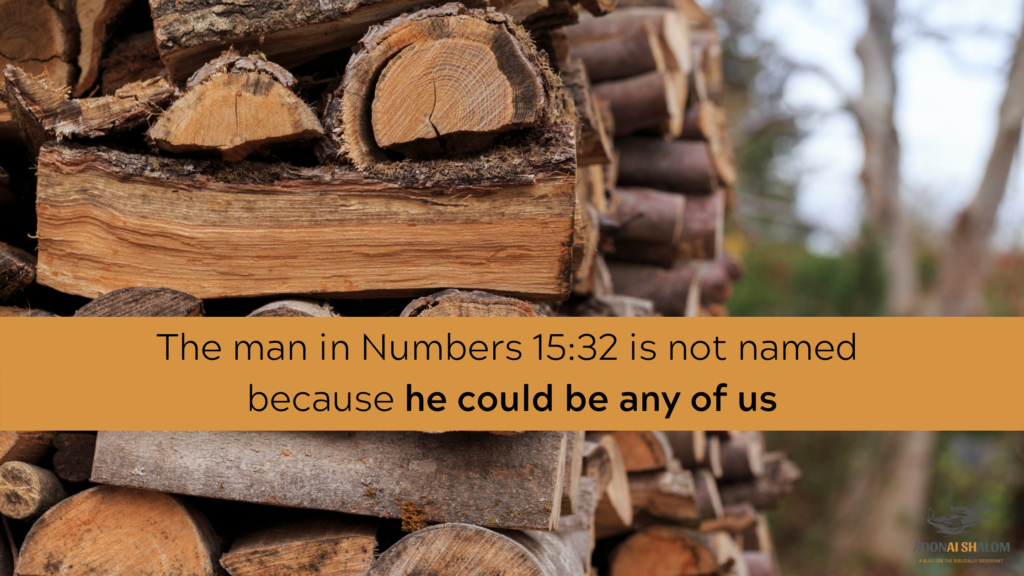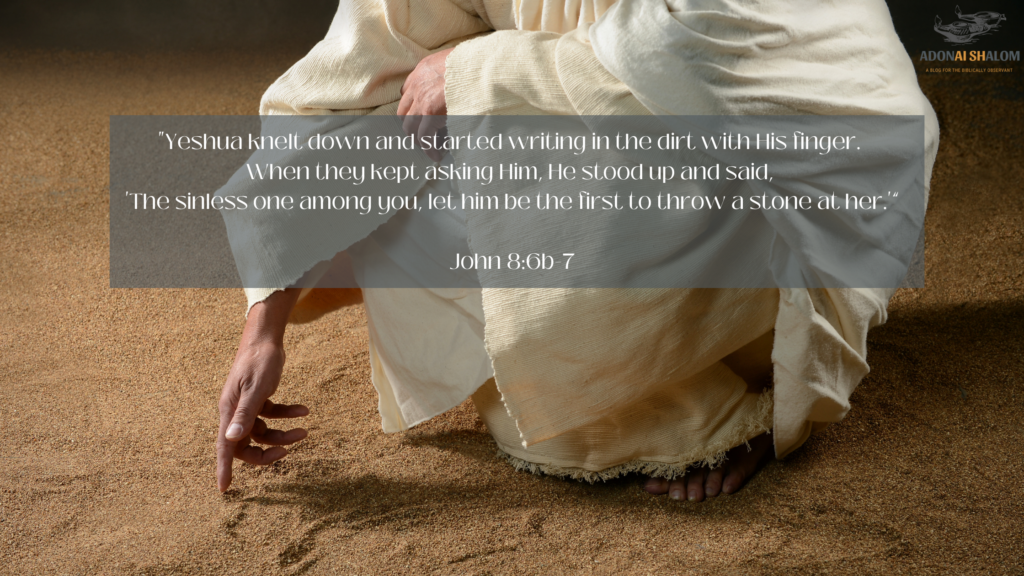15 Important Instructions from the Leviticus Holiness Code
Parashat Kedoshim (V’yikra/Leviticus 19-20) 5782 B”H
The Leviticus Holiness Code
The Holiness Code found in Leviticus 19 tells the people of God that they are to be holy, for ADONAI is holy.
The term in Hebrew is קְדֹשִׁים q’doshim (also spelled, kedoshim) – you shall be among those who are holy; the holy ones.
The instructions here are meant for the entirety of Israel, not just the priests and leaders.
"Speak to all the congregation of Bnei-Yisrael and tell them: You shall be kedoshim, for I, ADONAI your God, am holy." Lev.19:2, emphasis added
Though the Torah was written so very long ago, there are 15 points that are still completely relevant to us today.
These points contain important instructions to help us live in holiness (another term for “sanctification.”)
“This is the will of God — your sanctification.” 1 Thessalonians 4:3
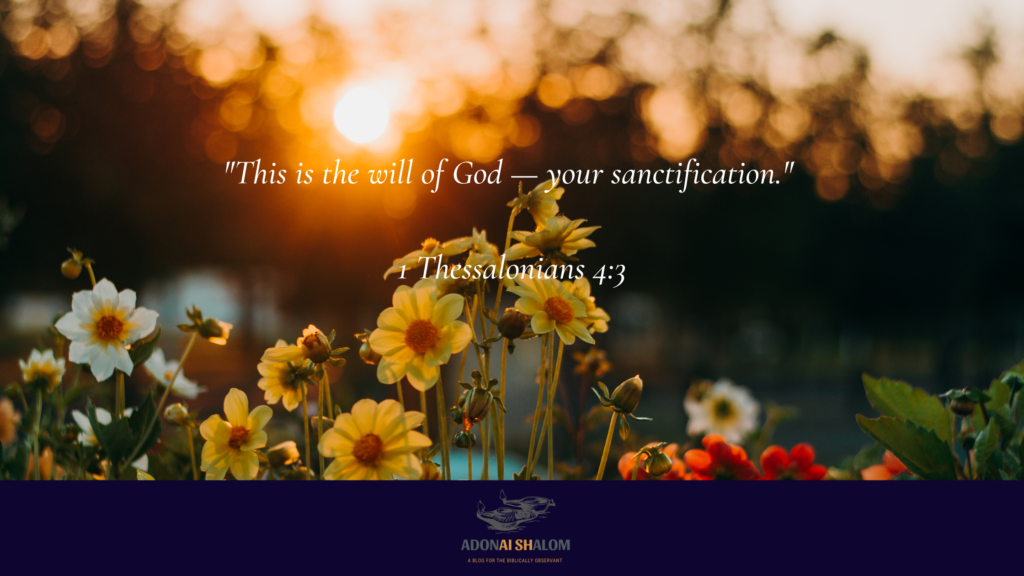
We have been made holy through what our Messiah did for us on the cross at Calvary (Col.1:20-22). We cannot be holy on our own or achieve holiness by doing good works. However, once we have received the gift of salvation, we are to continue to live as sanctified people:
"Therefore, since we have these promises, loved ones, let us cleanse ourselves from all defilement of body and spirit, perfecting holiness in the fear of God." 2 Corinthians 7:1, emphasis added
The fruit of our salvation is that we choose to live rightly. We choose holiness.
Here are instructions on how to do it!
Related post: The Leviticus 11 Controversy
Major points of the Leviticus Holiness Code:
1. Holiness requires that we must respect our father and mother (Lev.19:3).
"Every one of you shall revere his mother and his father, and keep My Sabbaths: I am the LORD your God." Leviticus 19:3 (NKJV) “Each one of you is to respect his mother and his father, and keep My Shabbatot. I am ADONAI your God." Lev.19:3 (TLV)
This seems so basic, yet look around us. How many people truly respect and honor their parents? Are you training your children to be respectful?
We must be cautious as to what we allow our children to watch. Many shows and movies targeted to young people today encourage aloofness and rebellion. We must oversee their usage of technology and encourage positive, godly friendships. Our job is harder than generations past – children today are truly inundated by information – both good and bad, and are targeted for their innocence.
How about grown up children? If their parent is in an assisted living facility, do they visit? Sadly, I have seen far too many of our elders in this country practically abandoned by their adult children, left to be cared for entirely by health professionals. I am thankful for the professionals, who give so much love, but it is never the same as the bond that ought to exist between a parent and their child.
The denigration of traditional family by modern society is ha-satan‘s way to attack this basic, fundamental principle.
To live in holiness, we must be respectful of our parents.
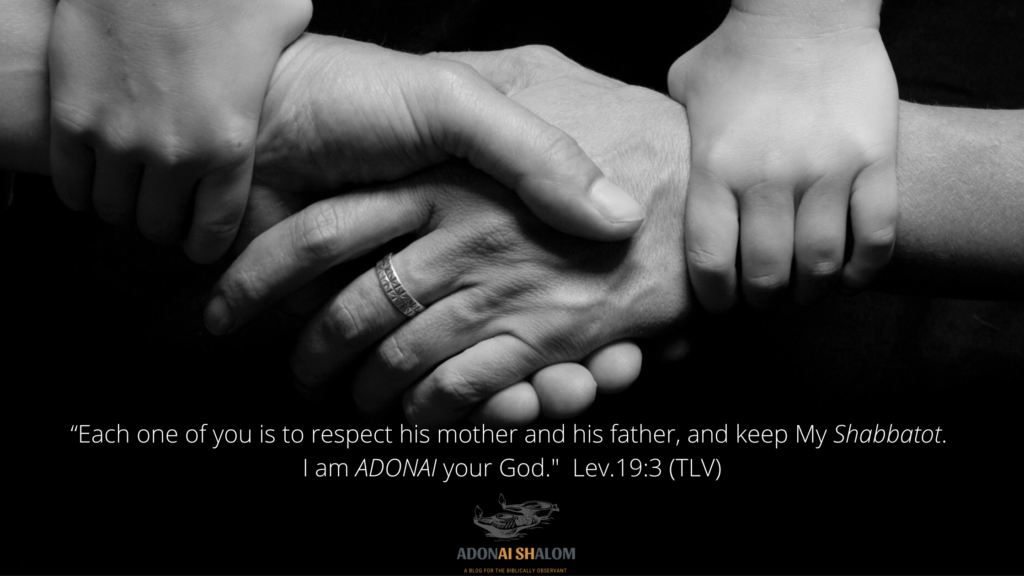
2. We are to keep God’s Shabbats (Sabbath Days) (Lev.19:3)
Notice that in the same verse that we are instructed to care for our parents, we are also instructed to keep God’s Sabbath days. That is because these concepts go hand-in-hand. If we love our families, we will want to spend time with them, and we will honor our LORD. Sabbath is about spending time with the LORD and with our families, resting and enjoying the presence of the LORD and our loved ones as well as our brothers and sisters in Messiah.
Assuming that our parents taught us to keep Shabbat (which many didn’t, because this has been lost over time), we then keep the Shabbat to honor their teaching to us, as well. Shabbat is ultimately about family and keeping our generations on the right path.
The wording of this verse catches my attention. “Keep my Shabbatot.” “Keep my Sabbaths.” God tells us the Sabbath belongs to Him – consistent with our Messiah’s teaching that He is the LORD of the Sabbath (Mark 2:28). It is an important day to our LORD, so it should be important to us, too. Sabbath was established after creation – God rested on the seventh day and sanctified it (Genesis 2:3). Sabbath, according to the Bible, is Saturday, rather than Sunday.
This point is so important to the LORD that He reiterates it just a few verses later in Leviticus 19:30. “You are to keep My Shabbatot, and reverence My Sanctuary. I am ADONAI.” We must take seriously the command to rest.
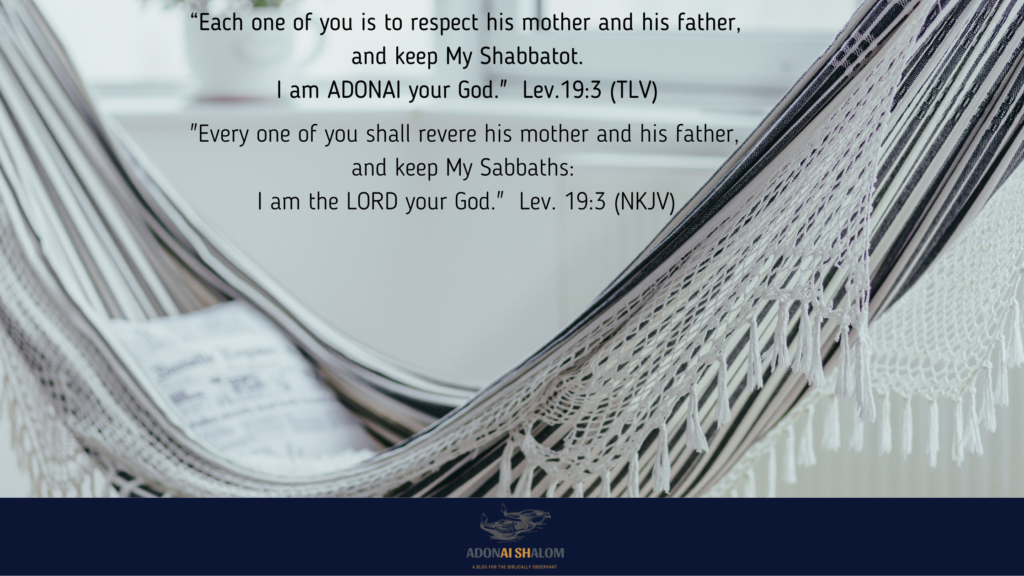
What does rest have to do with holiness? Spending time at rest allows us to minister from a place of restoration.
We cannot help others if we don’t care for ourselves.
3. We are to not turn to idols (Lev.19:4)
A few years ago, we drove from the Texas border down to south central Mexico. During our trip, we saw many handmade shrines along the dusty paths bordering the Chihuahuan desert. The conditions in some of these desert regions are so harsh and desolate that the improvised, crude nature of these altars seemed to aptly reflect the difficulties of life in these places.
Why do people turn to idols? When do people feel inspired to build their own high place?
When they long for a relationship.
When they want answers to life’s hard questions.
When they genuinely seek, but have not yet found.
When they are trapped in a generational cycle of idolatry.
There is true hope in the LORD, but some people have not yet heard. And some who hear will reject the Truth, in favor of their idolatrous traditions and customs. But the stronghold on their lives is rooted in the idolatry of generations before, pagan traditions passed down with the hope of finding a better life, but missing the mark.
In several different villages in southern Mexico, we witnessed processions of people walking down the roads carrying wooden idols they had made.
I had never seen idolatry in such a pure and unabashed form. Sure, I had seen statues and carvings, but never entire communities of people parading these objects for purposes of worship.
In a sense, we are blessed in the United States because this isn’t something we “see.”
But we are also blind because we don’t realize that idolatry is just as rampant here, it just takes other forms.
You see, ha-satan is astute. Historically, our Protestant-influenced culture did not make easy room for idolatrous religious images and carvings. Holiness was taken more seriously. So the devil has found ways to lure people into less obvious forms of idolatry. Worship of self, materialism, obsession over celebrities, the love of money . . . there are so many forms of idolatry. It is sinful to look to these things as though they are deity.
We are clearly told in the Bible’s Holiness Code that in order to be holy as the LORD is holy, we mustn’t have idols of any sort.
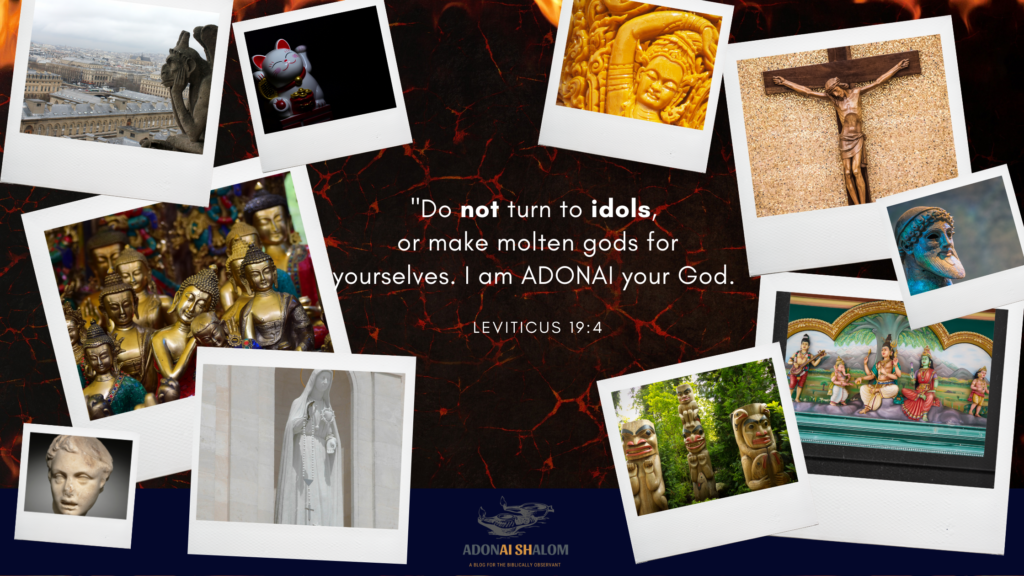
4. We are to provide for the poor. (Leviticus 19:9)
Did you know that Ruth was able to glean from the fields of Boaz (Ruth 2) because of the law found in the Leviticus Holiness Code of Leviticus 19:9? It’s true!
Those who owned land were obligated by the Word of God in the Torah to intentionally leave the corners of the field unharvested and not to glean the leftovers of their crops in the fields. Specifically, landowners were not even to pick up fallen grapes from their vineyards (Lev.19:10). These remnants were to be left for the poor and the stranger.
There is always a lesson about hospitality to be found in the Word of God. We are to love and help the poor with kindness.
True holiness embraces abundant, radical hospitality.
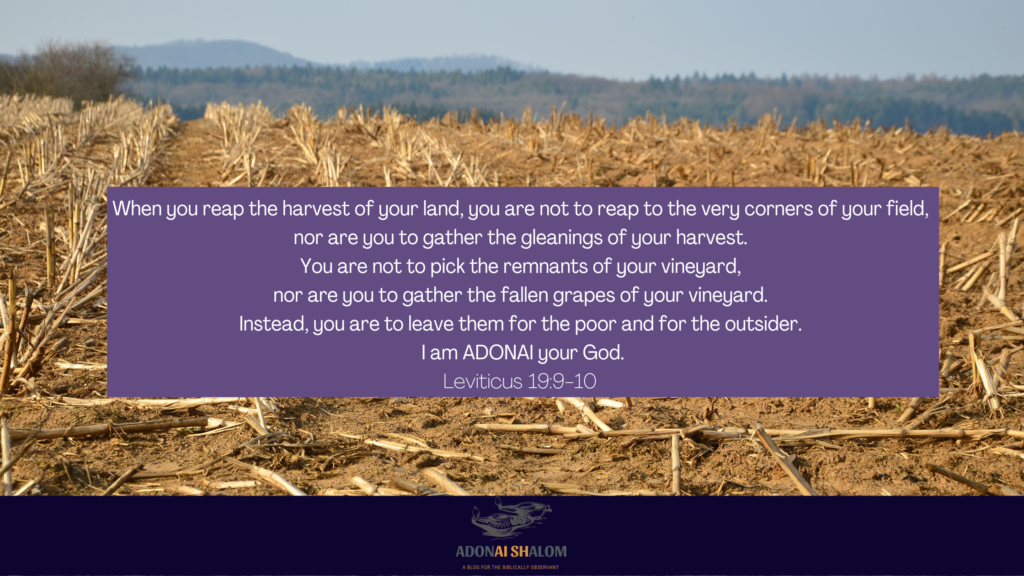
5. We mustn’t steal, lie, or deceive. (Leviticus 19:11)
Stealing, lying, and deception all go together. We must be careful, especially those of us in ministry positions.
Peter warned that judgment begins in the house of the LORD. How many ministries have brought embarrassment and shame upon themselves for lying and deceiving people or stealing tithe money?
Resist all temptation to participate in schemes that will harm the LORD’s flock!
You are responsible to set an example for believers by living in true holiness, according to the Word of God.
"For the time has come for judgment to begin with the house of God. If judgment begins with us first, what will be the end for those who disobey the Good News of God?" 1 Peter 4:17
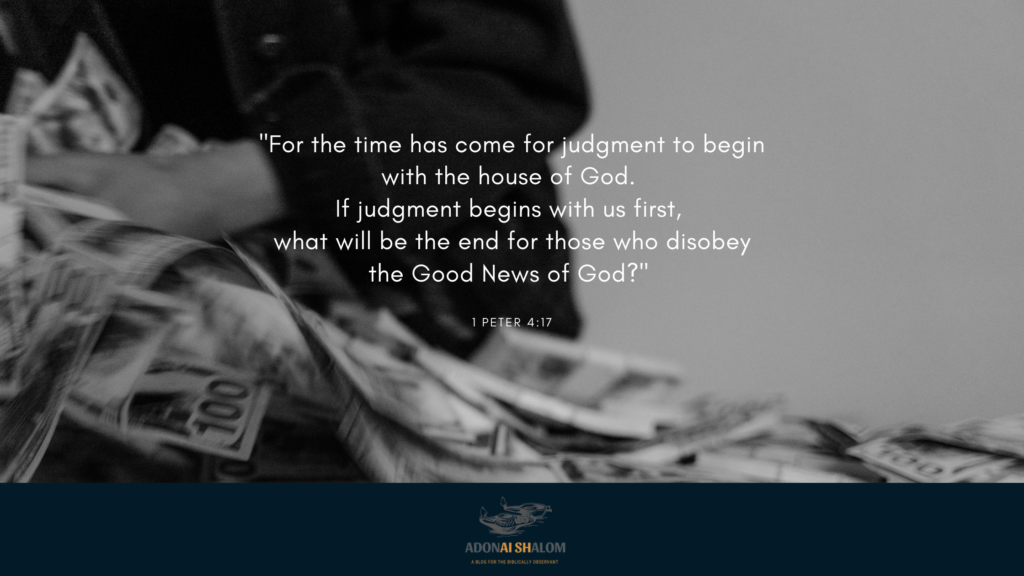
6. We must never swear by YHVH’s Name falsely. (Leviticus 19:12)
Swearing by YHVH’s Name falsely profanes the Name of your God, according to this Scripture.
I don’t know about you, but I shudder at the thought. We must live in holiness and honor the Name of the LORD.
This is written, though, because it is inevitable that certain members of the house of the LORD will fall into error. We must not follow suit.
7. You are not to oppress your neighbor nor rob him.
We need to learn to live in peace with everyone. We must be honest and good to our neighbors.
Many of the commands in the Leviticus Holiness Code sound like the Aseret HaDibrot: The Ten Words (i.e., the Decalogue or “Ten Commandments“). They are rules to live by, for our own good and the good of our communities.
If you truly want to live in holiness, find ways to bless your neighbors.
8. If you are a day employer, you are to pay your hired worker at the end of their work day, not hold the money overnight. (Leviticus 19:13)
The Leviticus Holiness Code provides for workplace fairness as well as the proper handling of money.
Day laborers are usually at a disadvantage, lacking their own land or company.
Day employers who obey the LORD will not take advantage of their workers or cheat them and will compensate them fairly and at a reasonable time.
I knew a wealthy man, who claimed to be a devout Christian, who thrived off of cheap labor. He would hire unskilled laborers and pay them the very least amount possible to retain their services. His workers would come and go because they were paid so little they would try to find work elsewhere. To his credit, I heard that he did pay his workers fairly quickly, but a person truly living in holiness will not take advantage of people or try to intentionally maintain them at poverty level. If you are in a position where you have financial advantages, find ways to bless those who work for you. Your team will stick with you and you will prosper, as well.
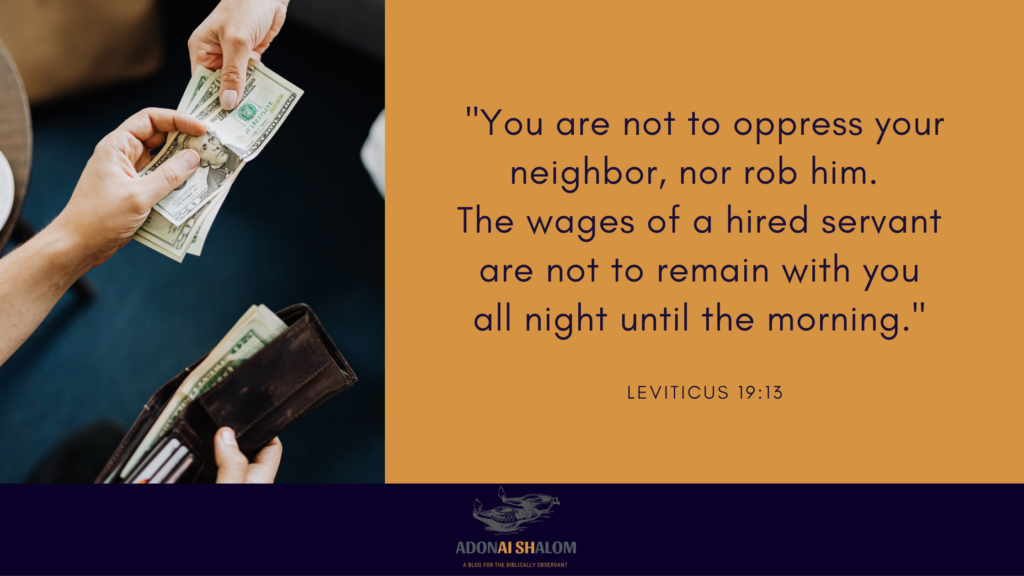
9. We must care for the rights of those with disabilities. (Leviticus 19:14)
Specifically, the Torah here is concerned for those who are deaf or blind.
We are not to curse anyone who has a disability nor make their lives difficult (putting a “stumbling block” before them).
Related post: A Cure Changes Everything.
If you truly seek to live in holiness, look for ways to help and befriend the disabled. You will be blessed.
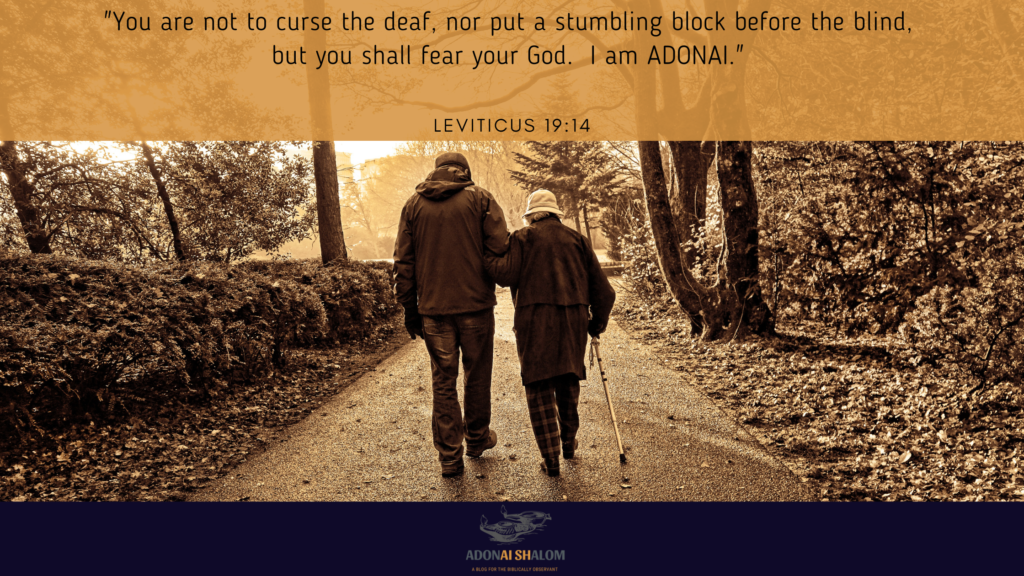
10. We must be impartial in our judgments. (Leviticus 19:15)
When you are in the position to make a decision that will affect others, you need to show impartiality. These verses deal with justice. We must seek justice, whether it is in the workplace or in our neighborhoods. We cannot allow political preferences to cloud our judgment, either.
In all things, we must be fair. If you are a judge or someone in authority, you mustn’t show favoritism to others in similar positions. All cases must be dealt with fairly, regardless of financial or social status.
"You are not to be partial toward the poor nor show favoritism toward the great . . ." Leviticus 19:15
We need godly judges and lawyers who seek to live in holiness! Pray for those who are studying law, that a new generation of godly lawyers would be raised up. That they would make rulings that honor the Word of God and that they would not be swayed by either political party, but rather make all decisions based on God’s Word.
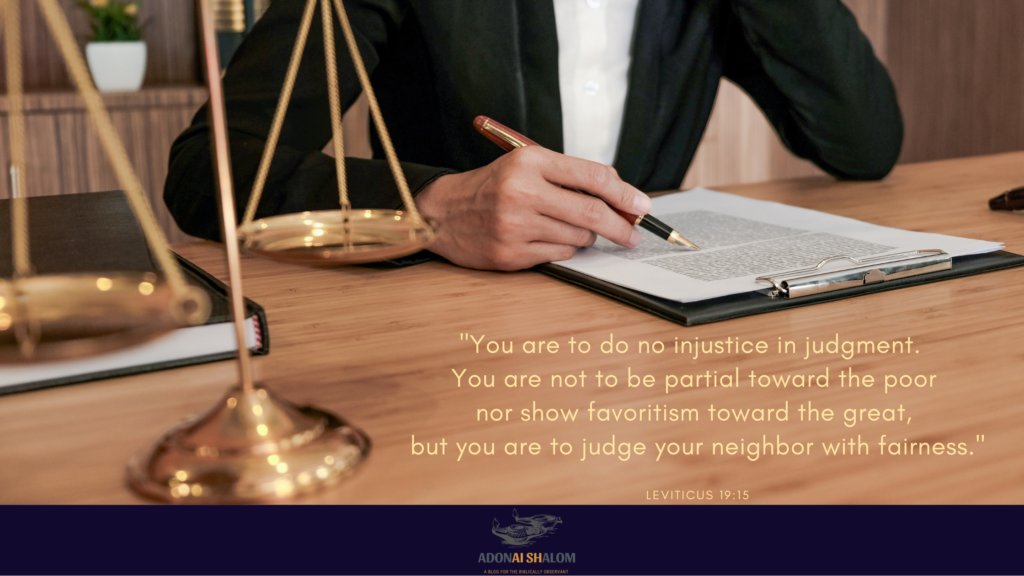
11. There is no place for slander or hatred. (Leviticus 19:16-17)
The Bible clearly teaches that we mustn’t go telling tall tales about people. In our day of YouTube and social media, so many horrible TikTok “challenges” and slandering occurs. Leviticus 19:16 says, “You are not to endanger the life of your neighbor.”
We are not to hold grudges or take revenge or do anything that could harm another human being.
If we want to live in holiness, we must use social media with caution. We should use the power of technology to spread the Good News of our Savior rather than slander and hatred.
12. Love your neighbor as yourself. (Leviticus 19:18)
Yeshua (Jesus) told us that the second greatest commandment is “Love your neighbor as yourself.” Mark 12:31
He got that from the Torah, you know! He wanted us to understand the heart of our Father as revealed in the entirety of the Scriptures.
How do we love our neighbors as ourselves? We learn to love ourselves, not in an idolatrous way, but seeing ourselves as God sees us. He loves us and He has made us worthy by the blood of His Son, the Lamb of God. If we love ourselves, we can love those around us, most primarily our families, and that love extends to our neighbors.
True holiness requires us to learn to love.
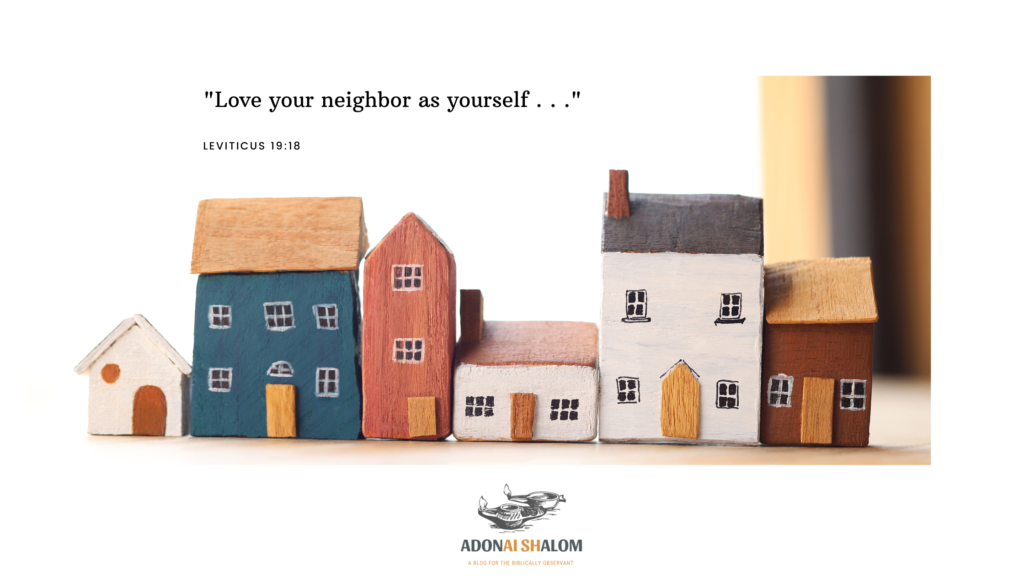
13. We must “rise up in the presence of the gray-haired and honor the presence of the elderly.” (Leviticus 19:32)
Just as we must honor our parents, we are to honor the elderly. They have lived long lives and have much wisdom to share. Our family has been watching a Korean series on Netflix because my children are learning about Asian culture and we have all been struck by the amount of deference to elders depicted. This type of respect truly is foreign to American culture and we could learn a thing or two.
As discussed above, we will live in holiness if we respect and honor our parents and elders.
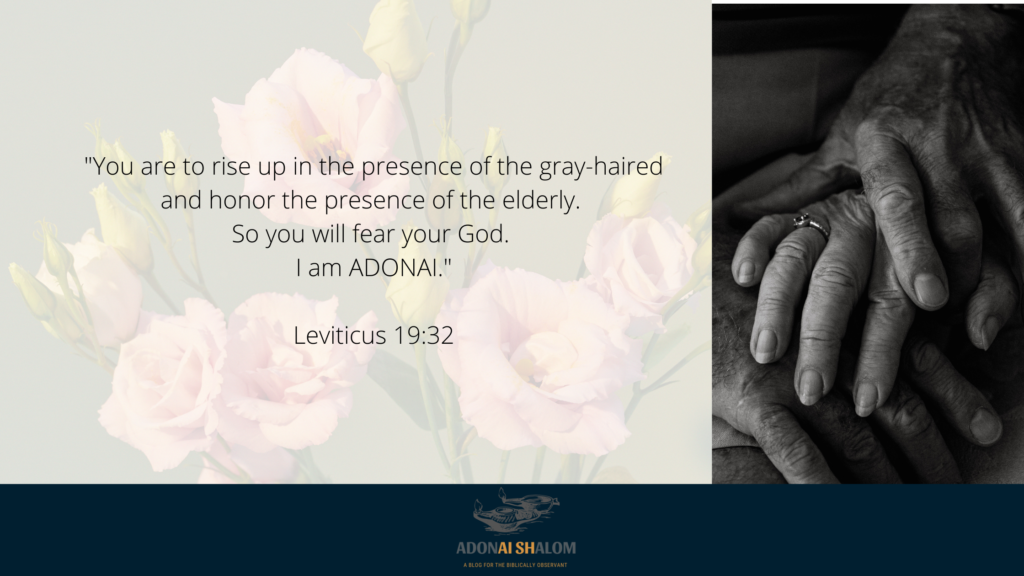
14. We must show love and hospitality to the immigrant (Leviticus 19:33-34)
Immigration is a controversial subject…. yet another overly-politicized issue of our day.
While our nation must have laws and borders, we also must demonstrate kindness to immigrants. There is no place for racism if we are living in holiness.
Some of the very best people I know are immigrants to our country!
If you want to live in holiness, be welcoming of those who are newcomers to our nation.
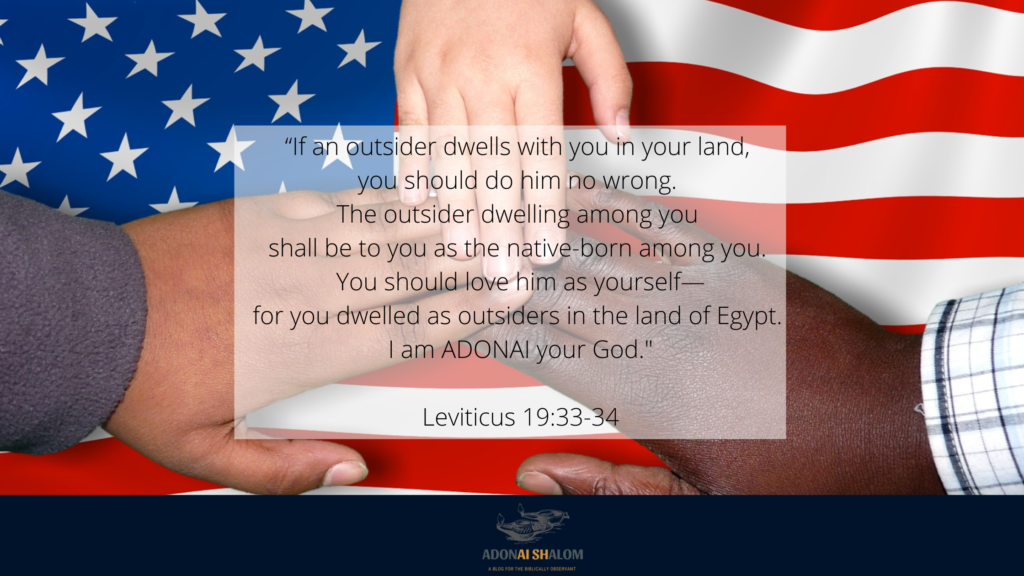
15. Honesty is the best policy (Leviticus 19:35-36)
The Scriptures are clear that we must be honest in all things. All items used for measurements, weights, and balances must honest according to the Leviticus Holiness Code.
Here, the LORD reminds Israel that He brought them out of Egypt.
God’s people were brought out of Egypt so they could live differently from the Egyptians. I would expect that dishonest measurements were probably used in ancient Egypt to take advantage of the Israelites living in bondage. Surely the freed people of God should be expected to demonstrate honesty in all matters which is a way of showing gratitude as well for all the LORD has done.
A person who lives in holiness is honest.
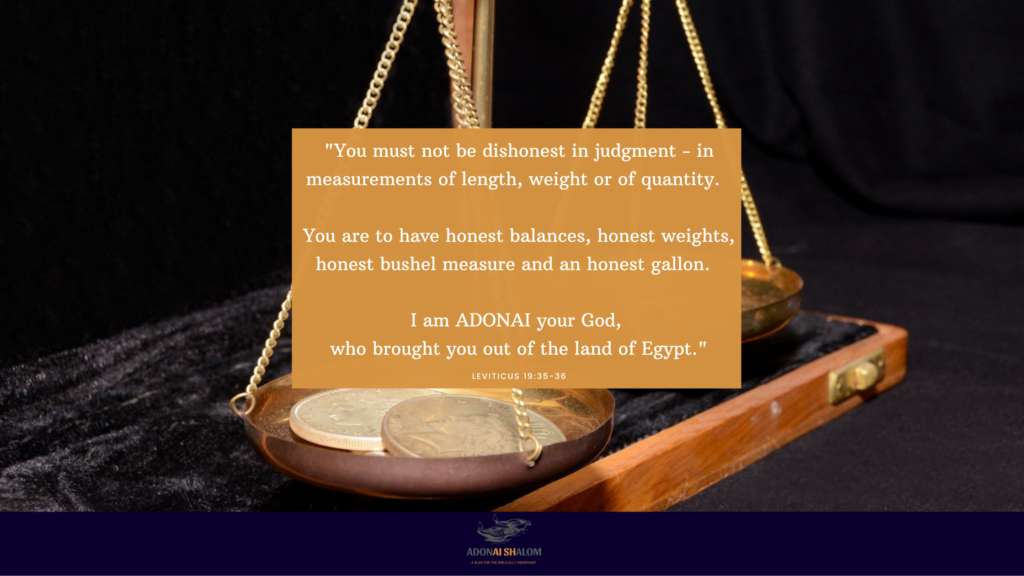
Are these points still relevant to us today as followers of our Savior Yeshua (Jesus)?
Each of these points help us to live in kindness, with righteousness, putting others ahead of ourselves. There are more instructions found in Leviticus 19, but they deal with more specific situations such as if a man lies with a slave girl or if you are planting in the land of Israel. Perhaps they don’t seem “as relevant” to us, but if we read them carefully, we can see how applicable even these remain even to this day.
For example, it remains prudent not to “eat any meat with the blood still in it,” (Lev.19:26) and it certainly remains forbidden for disciples of Messiah Yeshua (Christ Jesus) to practice any type of “sorcery” (Lev.19:26). It is in this same passage we find the prohibition against tattoos (Lev.19:28). I know my view is unpopular today as many try to justify “Christian” tattooing, but Biblically-speaking, it does not make sense to pick and choose what we like and don’t like if it is all in the same portion of Scripture, in the Holiness Code.
A few years ago, when we pastored a church in Tennessee, one of the sisters in the congregation got a tattoo around her wrist. She came to show it off one day, and I fear I offended her when I was not nearly as excited about it as she was. I should have sat her down and spoken more gently to her, but my initial reaction was that she had made quite a mistake! We have an obligation to protect the Temple, not put graffiti all over it.
"Or don’t you know that your body is a temple of the Ruach ha-Kodesh who is in you, whom you have from God, and that you are not your own? For you were bought with a price. Therefore glorify God in your body." 1 Corinthians 6:19-20
Interestingly, it has become cultural. Our congregation was comprised of both English-speakers and Spanish-speaking Hispanic immigrants. Our Hispanic members were very wary of the sister’s tattoo, while the English-speaking folks raved about it. It really caused a controversy between the groups! In this case, I believe the Hispanic folks knew the darker undercurrent of tattooing from their experiences with the occult in their home countries.
Ok, time to change the subject! I know that not everyone will agree on this!

In all things, seek the LORD in all His Holiness
Allow the Holy Spirit to illumine your understanding. He will show you the incredible connections made throughout the entirety of God’s Word; how the Bible’s text is so interwoven and contains no error. When I first went to undergraduate school to learn theology, I went there with the intent of disproving the Scriptures. I didn’t think it was possible for the Bible to be faultless. But the Holy Spirit opened my eyes to the Truth and I was able to continue my studies, fully convinced of the inerrant nature of the Bible.
If He could do that for me, He can do that for you.
Ask Him to show you His will and His ways, and your life will be forever changed!
Be encouraged today, that He can help you to walk in holiness and in the fullness of His love and grace!
Please leave a comment and subscribe today! We all need encouragement to live holy. Which of these points would you like to work on, in your personal life? I would love to hear from you!


